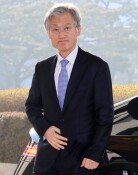Repeated delay in vaccination
Repeated delay in vaccination
Posted August. 11, 2021 07:32,
Updated August. 11, 2021 07:32
Citizens whose second jab of the Pfizer or Moderna vaccines is scheduled after next Monday have been given a new guideline to have a six-week interval temporarily until September, an update from the existing four-week gap recommendation. The South Korean government advises an extended vaccination interval, explaining that the ramifications of Moderna's vaccine fabrication lab issues will allow only half August's scheduled supply of 8.5 million doses to be delivered to South Korea.
With a longer vaccination interval, as many as 24.53 million citizens will have a delayed second shot. The change to the Moderna supply schedule has caused some disruption to that of the Pfizer vaccine. Prior to last month's launch of the vaccination program aimed at those in their 50s, the interval for those vaccinated with Pfizer was extended from three weeks to four weeks, which has recently been pushed back by two more weeks. Critics argue that the extended vaccination interval may possibly reduce effectiveness although it will make little difference in safety.
Forty million doses of the Moderna vaccine were supposed to be delivered to South Korea starting from the second quarter of this year as South Korean President Moon Jae-in made a call to the company's CEO in person last December. However, up until now, only 2.45 million and 5,000 doses have been supplied to the nation. Even while Moderna has constantly postponed the agreed upon supplies to Seoul since July, South Korean Prime Minister Kim Bu-gyeom simply said, "We have already got aligned with Moderna to make sure that 8.5 million doses are introduced to South Korea within August,” which was later met with criticism that Seoul is swayed by Moderna after an actual supply quantity turned out to be reduced by a half.
As a result, there is growing confusion at the forefronts of the COVID-19 battle. Some citizens are left dumbfound when they figure out that their second jab is scheduled during Chuseok holidays when medical centers are off duty. If the second shot is administered following the holidays, the interval is in essence extended to seven weeks, which only grows safety concerns. The vaccination interval for teachers and school workers who treat third to sixth graders and middle school students has been extended from three weeks to five weeks, which will make most of the vaccinations complete after school starts in September. In case of any overlaps in vaccination dates, schools will face some disruption in planning and giving classes to students.
In a meeting with senior aides of South Korean presidential office Cheong Wa Dae presided over President Moon on Monday, he did not mention Moderna nor order any additional supply measures, merely calling for the acceleration of the vaccination program. He even generalized the country's issue of disrupted vaccine supplies as if it were shared with other nations by stating, "Lack of vaccine production and uncertainties over supply are still the main issues across the globe.” However, he is not in a position to say so considering that South Korea ranks the lowest in terms of vaccination completion among the 38 OECD member states with as low as 15 percent of the South Korean population finished with vaccination. As there is no certainty that Moderna will ensure stable supplies, the South Korean government should not stop saying that everything is fine but explain candidly about the vaccine supply status from an objective viewpoint. Once trust in the government is eroded, it translates into the collapse of the quarantine system.





![[천광암 칼럼]장동혁은 대체 왜 이럴까](https://dimg.donga.com/c/138/175/90/1/wps/NEWS/IMAGE/2026/02/22/133399127.1.jpg)

